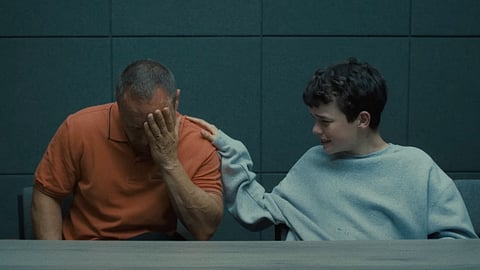
- LIFESTYLE
- FASHION
- FOOD
- ENTERTAINMENT
- EVENTS
- CULTURE
- VIDEOS
- WEB STORIES
- GALLERIES
- GADGETS
- CAR & BIKE
- SOCIETY
- TRAVEL
- NORTH EAST
- INDULGE CONNECT

The British miniseries Adolescence offers an unflinching look at the insidious effects of the so-called manosphere—an online ecosystem that breeds male rage, misogyny, and a warped sense of masculinity. The series revolves around the family of Jamie Miller, a 13-year-old boy arrested for the brutal killing of a female classmate.
Across four harrowing, one-take episodes, the show dissects the sinister role of social media and online influencers in shaping young boys’ perceptions of the world—and of women. The camera lingers uncomfortably, refusing to cut away as tension builds, mirroring the claustrophobic pressure of the online echo chambers Jamie finds himself trapped in.
There are no easy transitions, no comforting score—just a relentless, intimate lens into a family breaking apart at the seams. But this is not a whodunit—it’s a why-did-he-do-it. Each episode peels back another layer, revealing how a seemingly normal boy spirals into an ideology that pushes him to commit an unthinkable act. Directed by Philip Barantini with unrelenting intensity, the four-part series unfolds in a raw, immersive style that feels more like a social horror than a traditional crime drama.
The performances are nothing short of phenomenal. Stephen Graham and Christine Tremarco bring a raw, gut-wrenching realism to their roles as parents in denial, struggling to understand how their child could be capable of such violence. Erin Doherty’s portrayal of Jamie’s psychologist in episode three is particularly striking—an entire scene unfolding in a single room as she carefully unpicks the toxic ideas Jamie has absorbed. The young lead Owen Cooper playing Jamie delivers a haunting performance, embodying both the naivety of a child and the unsettling, indoctrinated certainty of someone who has been led astray.
This is not just another crime drama; it’s a wake-up call. A warning for parents, educators, and anyone who works with children: no child should have unfettered access to the internet. Even if you haven’t watched Adolescence, its themes will feel disturbingly familiar—crime, toxic masculinity, online radicalisation. Or as the show’s weary DS Misha (played by Faye Marsay) puts it: ‘the Andrew Tate shite’.
The series exposes the coded language of teenage boys’ online spaces—emojis and slang that seem harmless but often carry sinister undertones. Red pills, kidney beans, and dynamites act as markers of a community that feeds on grievance and resentment. Parents might assume their child is just scrolling harmlessly, but Adolescence makes it clear: behind the screen, a darker narrative is taking shape.
The series begins and ends in Jamie’s bedroom, a space that should feel safe but instead becomes the birthplace of his descent. The show’s final moments are gut-wrenching—there are no easy explanations, no cathartic resolutions, just a hollow silence that lingers long after the credits roll. How does a boy who sleeps beneath painted constellations come to commit an unthinkable crime? Adolescence doesn’t just pose this question—it forces us to reckon with it.
Jamie’s parents, played with devastating realism by Stephen and Christine, begin the series in denial. “He’s just 13,” they insist. What could he have possibly done? But as the episodes unfold, a grim picture emerges—Jamie’s secret online life, the toxic ‘red-pill’ ideology he’s absorbed, and the way he and his peers weaponise Instagram and emojis to humiliate and control one another.
The series brutally dissects how teenage boys are groomed—not in the traditional sense, but by an algorithm that preys on their insecurities. Social media bombards them with impossible ideals: sculpted bodies, hyper-masculinity, the pressure to be a ‘high-value’ man. They are fed the lie that 80% of women desire only the top 20% of men, reinforcing a belief that they are doomed to be incels — ‘involuntarily celibate’ unless they take drastic action to assert dominance.
This warped ideology, peddled by self-proclaimed experts with microphones, is not just about online clout—it has real-world consequences. Boys like Jamie internalise the message that women are ‘too choosy’, that rejection is humiliation, and that to be truly masculine, they must never appear weak.
By the time Jamie’s psychologist attempts to unravel his mindset, the damage is clear. The third episode delivers a particularly raw and unflinching sequence, an intense battle of ideas as Jamie struggles to articulate the rage and confusion brewing inside him. The show doesn’t offer easy answers because there aren’t any—just a painful exploration of what happens when masculinity is distorted into something dangerous.
Importantly, Adolescence doesn’t frame Jamie as a victim at the expense of Katie Leonard, the girl he killed. Nor does it absolve him of responsibility. Instead, it examines how he became ensnared in a poisonous ideology that convinced him humiliation was worse than anything—and that the only way to avoid it was to act. This series is a mirror held up to society, reflecting all the truths that make us uncomfortable. It’s not just one boy, one school, or one crime—it’s a pattern, a warning, and a reckoning. Adolescence leaves us with the pressing question: how many more Jamies are out there, scrolling in silence?